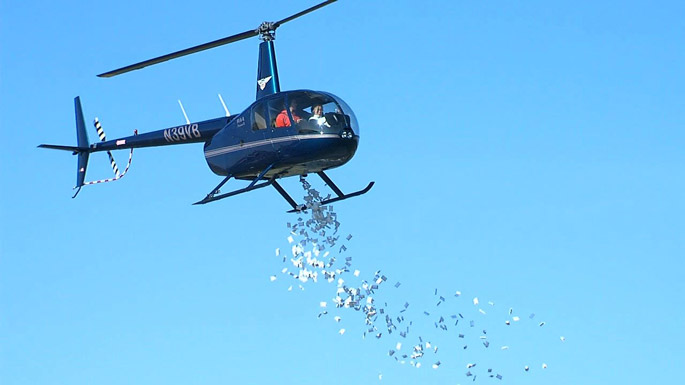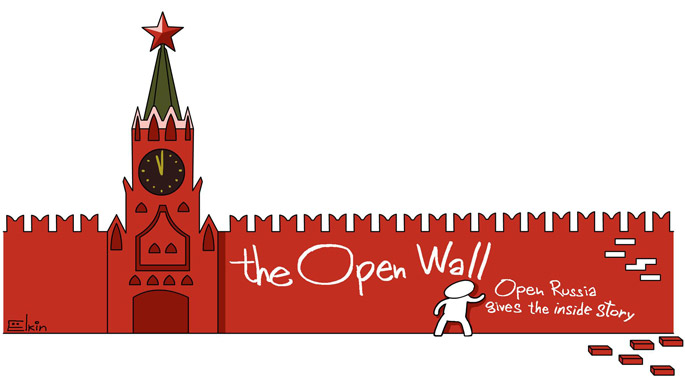Helicopter money
Helicopter money
Somehow, somewhere, the Kremlin needs to find money to throw at the population, before the Duma elections in September.

The problem with making promises you can’t keep, is that sooner or later comes the day of reckoning. You will remember all those promises the president made back in 2012 – the “May orders” showering money and subsidies on a restive populace. Even with a fair wind, it was unlikely that there would be the money to pay for all that largesse; and now there is much less to go round.
But, as everybody knows, the president doesn’t like to hear bad news, not unless it comes with some good news attached, which explains what happened at two recent government meetings …
First came the bad news: Anton Siluanov, Minister of Finance, confirmed that in order to meet the budget deficit goal of 3% GDP, the government will need to receive around an additional 300 billion roubles [a little over $4.5 billion] on top of the 140 billion indicated in the budget. You can almost picture the president frowning – that look he gives when he wants you to know this is serious.
Then came the good news: the Ministry of Finance expects to receive almost 450 billion roubles from state-owned companies in the form of dividends and interest on deposits. Smiles all round.
It’s a really good wheeze. State-owned companies will be forced to pay out 50% of their net profits as dividends, based on the higher of IFRS (International Financial Reporting Standards) or Russian Accounting Standards (RAS) earnings. The decree was signed into law by Prime Minister Dmitry Medvedev on April 18, but the document states that financial performance, investment plans, investment efficiency, and other variables will need to be taken into account.
This is what is known as the get-out clause; and you won’t be surprised to hear that everybody is trying to get out. In the past couple of weeks, there has been a stream of supplicants turning up in the president’s office, to plead poverty. Who got what, and who was turned away empty-handed, is one way of working out who’s next for the chop.
Igor Sechin, chairman of Rosneft, asked to be allowed to pay out a mere 25% of its profits to the state. The president expressed agreement, but appears to have later changed his mind because a government directive now obliges Rosneft to pay out the required 50% of its profits in dividends.
Next came Gazprom, led by Alexey Miller, who explained that Gazprom needs money to fund the Power of Siberia pipeline; and respectfully asked if he could therefore pay out 50% of adjusted net profit under RAS (i.e. 175.2 billion roubles) rather than 50% of net profit under IFRS (i.e. 395 billion roubles). The president was non-committal.
And so it went on – state-owned company after state-owned company, pleading and imploring, expecting that, as has always been the case, an exception could be made, just this once.
But things are so bad that the government is saying it can hope to accumulate 440 billion roubles only if it adopts an unyielding approach to the issue of dividends.
Only the figures don’t add up. Vedomosti newspaper has calculated that, even if everybody paid out, the budget would receive a far smaller amount from the largest dividend payers – between 206.1 billion and 259 billion roubles.
The state will receive 36 billion roubles from Rosneft. Gazprom’s dividends are either 67 billion roubles under RAS or 151 billion roubles under IFRS (the state owns a 38.37% controlling stake in the company). If Transneft (78.1% state-owned), Bashneft (50.08% state-owned), RusHydro (66.8% state-owned), Alrosa (43.9% state-owned), Zarubezhneft (100% state-owned) and Sovcomflot (also 100% state-owned) pay out 50% of their profits under IFRS, then the budget will receive 55.9 billion, 14.6 billion, 10.5 billion, 7 billion, 4.5 billion and 10.6 billion roubles respectively. And that doesn’t come to 440 billion roubles.
Interest on deposits comprises a much smaller amount. In 2014, state-owned companies earned 7.4 billion roubles by placing excess funds on deposit. In 2015, 78 billion roubles were placed on deposit by state-owned companies; according to the Central Bank, the average interest rate of deposits of more than a year stood at 10.1% at the beginning of 2016, meaning that the budget could expect to receive a mere 7.9 billion roubles.
The line of defence adopted by state-owned companies is this: the government has imposed strategic objectives on us only to deprive us of the means to implement them. Rosneft announced in a press release that the dividend payouts may result in the non-fulfillment of the presidential decree requiring it to invest in the future. Gazprom, meanwhile, has issued a statement that it will most likely be forced to aid the cash-strapped VEB [Vnesheconombank, the Bank for Development and Foreign Economic Affairs] as well, by buying back 2.7% of its own shares from the latter. Gazprom, however, has $18 billion on its accounts, of which $9 billion will be used to repay its debts, so it will be able to get by without government loans this year even given the 50% profit dividends.
In these straitened circumstances, these arguments count for nothing. Elections are won with helicopter money – throw money at the people below (and stuff the ballot boxes), and victory is almost assured. The problem for the president is that he also needs to keep his retainers happy. Until recently, there has been plenty for everyone to feed at the trough, but as the recession deepens, the number of feeding places is diminishing; and as every keeper knows, sooner or later, animals bite the hand that feeds them.




